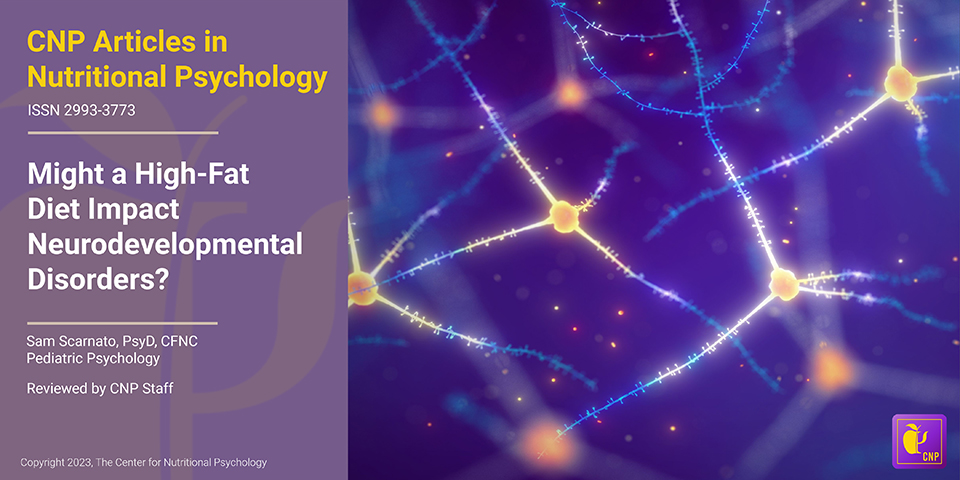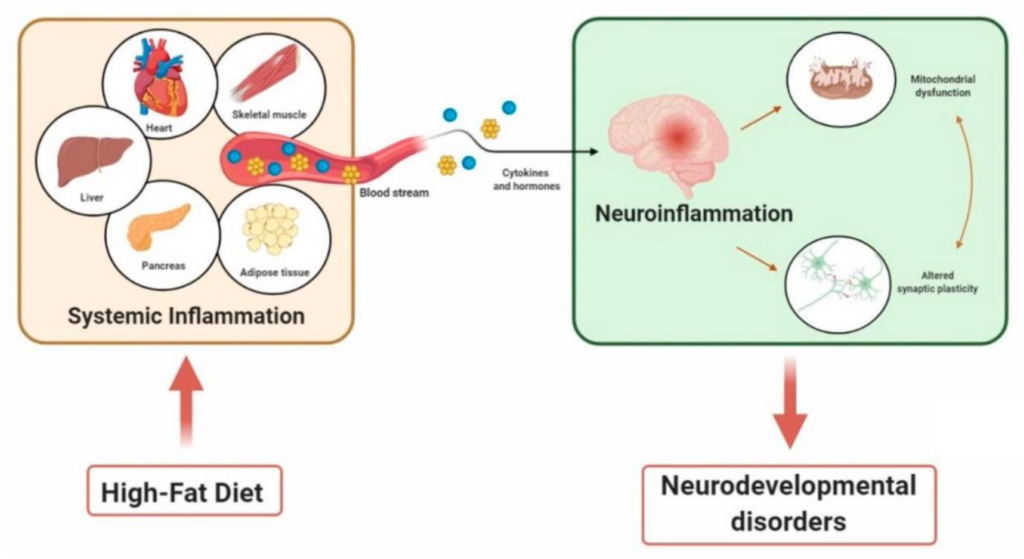Might a High-Fat Diet Impact Neurodevelopmental Disorders?

The Diagnostic and Statistical Manual of Mental Disorders, version 5, DSM-5 for short, classifies autism spectrum disorder, attention-deficit/hyperactivity disorder, intellectual disabilities, specific learning disorders, communication disorders, and motor disorders as neurodevelopmental disorders, or NDDs. This cluster of disorders is associated with abnormal brain development and impairments in cognition, social-emotional functioning, and speech and language skills.
A common feature of NDDs involves changes in synaptic plasticity in the brain. Synaptic plasticity is the brain’s process of modifying synaptic transmission in response to experiences and stimuli.
Lifestyle factors, such as diet, impact synaptic plasticity.
While the underlying molecular mechanisms associated with changes in synaptic plasticity are only partially understood, lifestyle factors, such as diet, also impact synaptic plasticity. In juvenile mice studies, a high-fat diet contributed to decreased hippocampal neurogenesis, poor memory, and impaired synaptic and cognitive function. By examining the molecular mechanisms affected by a high-fat diet, defined as a diet with a 30-50% fat content, Penna and his colleagues suspected there’s potential for understanding the molecular mechanisms associated with NDDs.
Based on their review of study findings, Penna and his colleagues developed a diagram to illustrate potential molecular mechanisms connecting metabolic dysfunction of a high-fat diet to synaptic plasticity deficits related to NDDs.

Figure 1.
(From Penna et al., 2020)
A chronic, high-fat diet contributes to low-grade inflammation in the body. Persistent activation of the body’s inflammatory response system leads to the release of proinflammatory cytokines and other hormones into the bloodstream. This results in neuroinflammation.
A decrease in Brain-Derived Neurotrophic Factor (BDNF) — a neurotrophin impacting synaptic transmission, was detected after consumption of a high-fat diet.
An associated dysfunction of neuroinflammation is changes in synaptic plasticity. These changes could be brought on by dysregulated local protein synthesis. In mice studies, a decrease in Brain-Derived Neurotrophic Factor (BDNF) — a neurotrophin impacting synaptic transmission, was detected after consumption of a high-fat diet (Pistell et al., 2010). The resulting hypothesis is that lowered levels of BDNF may lead to lowered protein synthesis at the synapse. This contributes to mitochondrial dysfunction, which is linked to neuroinflammation, and alterations in synaptic plasticity found in NDDs — the effects of a high-fat diet.
Improving the function of mitochondria in the synapse could have potential therapeutic and/or preventive benefits for neurodevelopmental disorders.
Since neuroinflammation and impaired synaptic plasticity are associated with NDDs, Penna and his colleagues suggested that diet changes focused on improving the function of mitochondria in the synapse could have potential therapeutic and/or preventive benefits for neurodevelopmental disorders.
References
Pistell, P. J., Morrison, C. D., Gupta, S., Knight, A. G., Keller, J. N., Ingram, D. K., & Bruce-Keller, A. J. (2010). Cognitive impairment following high fat diet consumption is associated with brain inflammation. Journal of Neuroimmunology, 219(1-2), 25–32. https://doi.org/10.1016/j.jneuroim.2009.11.010
-
CNP Super Admin
February 05, 2022 at 01:43 am
Dear Dr. Bracchitta, Thank you for your question! The paper by Penna et al. referenced in the blog article is a review of several findings. The authors of the paper focused on studies exploring the effects of a high-fat diet (HFD, with 30-50% fat content) without controlling for other macronutrients, such as protein and carbohydrates. Penna et al. did briefly mention the mounting evidence in support of utilizing the ketogenic diet (KD) to alleviate symptoms associated with Autism Spectrum Disorder (ASD). They note, however, the difference with KD is that not only is there a focus on high fat, but sufficient protein and low carbohydrate intake must be present. To examine the potential molecular mechanisms connecting metabolic dysfunction of a high-fat diet to synaptic plasticity deficits related to NDDs, the studies in their review solely focused on high-fat intake, not the typical KD combination of high-fat and low-carbohydrate consumption. Thank you again for your inquiry. We kindly refer you to the study and/or its authors for further details on the study: https://www.mdpi.com/2076-3425/10/11/805. -CNP Staff -
Kristi Bracchitta, Ph.D.
February 04, 2022 at 12:04 am
Was the composition of the high fat diet discussed? For example, there is a body of literature that suggests clean keto diets, which are higher in fat composition and lower in carbs, actually increase BDNF and can be helpful in managing neuroinflammation. I am curious how the diet referenced here compares to a ketogenic high fat diet.








Leave a comment